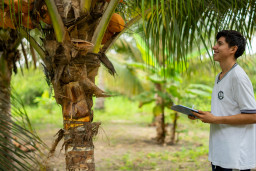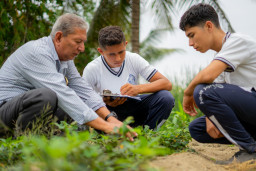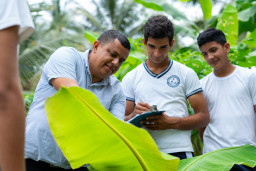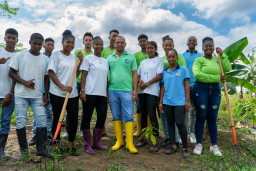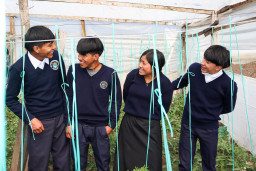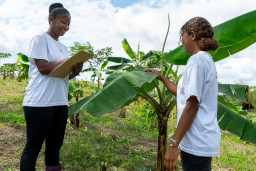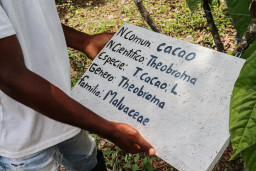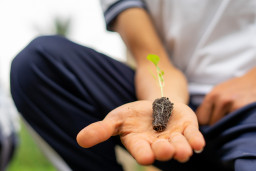
Teachers and trainers play a critical role in equipping youth with the skills needed for a sustainable future. Through a focus on youth skills education and agricultural projects in Ecuador and Uganda, VVOB, in partnership with ministries of education, is working towards bridging a skills gap. In this article, we explore the importance of a green future, the significance of cross-sector partnerships in education, and the role of quality agricultural education and training for all.
According to research from the International Labour Organization (ILO) young workers are twice as likely as adult workers to live in extreme poverty and are also far more likely to be informally employed. The African Development Bank (AfDB), reports that every year around 12 million young people enter the job market but only 3 million formal jobs are created. A shortage of decent employment opportunities for youth stands to threaten stability and inclusive development around the world. However, a potential solution beckons – the green economy.
The concept of the green economy is broadly understood as an economy that results in the “improvement of human well-being and social equity, while significantly reducing environmental risks and ecological scarcities” (UNEP). It’s expected that through a transition to the green economy, new ‘green jobs’ will emerge and lead to increased opportunities for youth in the future of work. In ILO’s World Employment and Social Outlook 2018, the green economy is predicted to create 24 million jobs globally in the next 20 years. But as new job opportunities emerge, will youth have the needed skills to seize them?
Enhancing education through competence-based curricula and cross-sector partnerships
Education reforms worldwide focus on equipping youth with future-proof skills and facilitating a smooth transition from school to work. In Ecuador, VVOB collaborates with the Ministry of Education to improve quality in technical education. This partnership also involves engaging employers and entrepreneurs in the education system, particularly in secondary technical education. By connecting students with real-world professionals, young people's career aspirations can be shaped effectively. Multi-sectoral partnerships play a vital role in aligning education with industry needs, providing mentorship and internship opportunities, and fostering entrepreneurship and innovation.
Recognising the importance of multi-sectoral partnerships, VVOB recently spoke with Moazzam Shah Bukhari Syed, an award-winning sustainable development leader and education activist. Syed emphasised that partnerships between sectors are vital in supporting youth to find decent work.
As Africa emerges as the youngest continent in the world, with an estimated largest youth workforce in the world by 2040, education systems must prioritise preparing youth with literacy, competency, and market-driven skills. In Uganda, the national Technical Vocational Education and Training (TVET) Policy aims to expand stakeholder involvement in vocational training by engaging labour market actors in qualifications and curriculum development, training, assessment, and certification processes. These efforts aim to ensure a seamless transition for Ugandan youth into gainful employment.
Quality education for all: agriculture education and training
Quality secondary general and secondary technical and vocational agricultural education and training play an important enabling role in motivating young people to pursue work in agriculture as a positive option. Approximately 80% of the 1.2 billion jobs depending directly on ecosystem services are in agriculture (ILO 2018).
In Ecuador, the agri-food sector is a fundamental pillar of the economy, employing a significant portion of the youth population. However, educational institutions face challenges in guiding students towards study pathways and career selection. This is evident in the overwhelming demand for careers in health and medicine compared to the services sector, where there is a greater need for professionals.
In Uganda, agriculture accounts for about a quarter of the country’s GDP and a great proportion of exports. By introducing agriculture as a compulsory subject in lower secondary education, Uganda is supporting learners to acquire practical skills aligned with the majority of occupations, in alignment with the country’s Green Growth Development Strategy and the National Strategy for Youth Employment in Agriculture which aims to achieve inclusive economic growth by equipping young people with technical skills for climate-smart farming and entrepreneurship in agriculture.
Empowering teachers
Just as youth need the skills to transition to the green economy so too do teachers. Quality education depends on quality teaching and training.
Speaking to VVOB ahead of World Youth Skills Day, Richa Gupta, Co-Founder of Labhya Foundation & Young Leader for the SDGs, emphasised the critical role teachers and trainers play in building a sustainable future alongside young people: “Beyond facilitating curricula, teachers have a large role to play in skilling youth for a sustainable future. By being co-creators of skill-based programming and by modelling the skills of the future, teachers can pave the way for leaders of today and the future.”
In Uganda, the preparation of teacher skills and competences lags behind the pace of change of industry and skill demands in the wider economy (Uganda Education and Sports Sector Strategic Plan 2017-2020). To address this, VVOB is working with the Ministry of Education to improve the quality of school-based agricultural education and training, by strengthening teachers and instructors' capacity to teach agriculture practically and keeping teachers and instructors abreast of developments in areas such as ICT for agriculture, sustainable agriculture, and occupational health and safety. In partnership with three colleges, VVOB is supporting the development of quality pre- and in-service teacher and (assistant) instructor training and school leadership with plans to develop and pilot a continuous professional development programme.
Similarly, in Ecuador, VVOB is improving the quality of agriculture and entrepreneurship teaching in Ecuador’s secondary schools (bachillerato-level) that offer the field of study ‘Agricultural Production’. Over the course of our 5-year project in Ecuador, in-service teachers and in-service school leaders will be equipped with the competences to teach a model of effective, gender-responsive agriculture and entrepreneurship education that combines study and career guidance, project-based learning for agri-preneurship, and work-based learning and that links schools to the agriculture world of work. Access to quality continuous professional development opportunities will also be provided by the Ministry of Education’s pedagogical counseling services (asesoría educativa) and partner universities.
A green and just transition
While Ecuador and Uganda present very different contexts, similarities can be drawn across the universality of the potential of the green transition to ensure a more sustainable future for youth. Equipping youth with the skills needed requires collaborative efforts between educators, policymakers, governments, and stakeholders across sectors. By empowering teachers, fostering the transition to a green economy, and prioritising quality education, we can pave the way for a brighter future.





